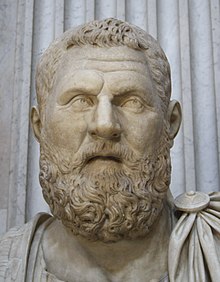Gaius Fulvius Plautianus
Gaius Fulvius Plautianus | |
|---|---|
 Plautianus | |
| Born | Leptis Magna, Africa Province |
| Died | 205 Rome |
| Allegiance | Roman Empire |
| Years of service | 197–205 |
| Rank | Praetorian prefect |
| Unit | Praetorian Guard |
| Other work | Consul of the Roman Empire in 203 |
Gaius or Lucius Fulvius Plautianus (c. 150 – 22 January 205) was a member of the Roman gens Fulvia. Like Sejanus, Perennis and Cleander, as head of the Praetorian Guard, he was formally extraordinarily powerful and influential in the administration of state affairs, and was involved with Julia Domna, the powerful wife of Septimius Severus, who played a prominent public and political role, in influencing the emperor's decisions.
Plautianus was originally from Leptis Magna, southeast of Carthage (modern Libya, North Africa). He was a maternal cousin and long-time friend of the Emperor Septimius Severus. Plautianus' father was another Gaius Fulvius Plautianus, born c. 130, whose sister, Fulvia Pia (c. 125 - after 198), was married to Severus' father Publius Septimius Geta.[1]
Plautianus was Praefectus vigilum (commander of the Vigiles in Rome) from 193 to 197.[2]
Plautianus was appointed prefect of the Praetorian Guard in 197.[3] Due to their friendship, Severus rewarded Plautianus with various honors, including a consular insignia, a seat in the Roman Senate and the Consulship of 203. During his consulship, Plautianus' image was minted on coins along with Severus' second son, Publius Septimius Geta.
He assisted Severus in administering the empire and became very wealthy and powerful. Severus made him his second in command. He competed with Julia Domna, the wife of the Emperor, in running the government (she too helped her husband run the empire, but was behind the scenes because of her gender). In 202, Plautianus married his daughter, Publia Fulvia Plautilla, to Caracalla (Severus’ first son and co-emperor) in Rome.[4] Plautianus began to conduct himself like a ruthless ruler, having those who opposed him assassinated or executed at will. He became so powerful that Caracalla and his effective mother, Julia Domna, began to be concerned. Aware of her reservations, Plautianus sought to disrepute, dishonor and disempower Julia. He had her servants and friends arrested and tortured in hopes of extracting some damaging testimony against her; however, he was unsuccessful in his efforts.[5]
The aforementioned marriage between Caracalla and Plautilla was not a happy one - In fact, Caracalla loathed both her and her father, threatening to kill them after becoming sole emperor.[6] When Plautianus discovered this, he plotted to overthrow Severus' family.[7][8]
This deeply troubled Julia Domna, who began plotting Plautianus's downfall. When Plautianus' treachery was discovered, the imperial family summoned him to the palace and ordered his death on 22 January 205. From this point onwards, the Empress became only the chief political advisor to her husband the Emperor; as Augusta of the empire, she was now the only influential person in the government to help Severus run the empire. After his death, at the request of Julia Domna, Plautianus’ property was confiscated, his name was erased from public monuments, and his son of the same name, his daughter and his granddaughter were exiled to Sicily. They were all strangled on Caracalla's orders in early 212.[8]
Family[]
He married Hortensia and had:[9]
- Fulvia Plautilla
- Gaius Fulvius Plautius Hortensianus (c. 170 - executed, 212).[10] He was married to Aurelia (born c. 170), daughter of consul in 174.[citation needed]
References[]
| Wikimedia Commons has media related to Gaius Fulvius Plautianus. |
- ^ Anthony Birley, Septimius Severus, The African Emperor, revised edition (New Haven: Yale University, 1988), p. 220
- ^ Ostia inscription CIL XIV, 4380
- ^ AE 1935, 156
- ^ "Herodian 3.10 - Livius". www.livius.org. Retrieved 2019-11-23.
- ^ Kerrigan, Michael (2016-07-15). The Untold History of the Roman Emperors. Cavendish Square. p. 204. ISBN 978-1-5026-1910-5.
- ^ "Herodian 3.10.8 - Livius". www.livius.org. Retrieved 2019-11-23.
- ^ "Herodian 3.11 - Livius". www.livius.org. Retrieved 2019-11-23.
- ^ Jump up to: a b Kerrigan, Michael (2016-07-15). The Untold History of the Roman Emperors. Cavendish Square. p. 207. ISBN 978-1-5026-1910-5.
- ^ Birley, Septimius Severus, p. 225
- ^ Birley, Septimius Severus, p. 221
Sources[]
- 150s births
- 205 deaths
- Imperial Roman consuls
- Ancient Roman generals
- Fulvii
- 2nd-century Romans
- 3rd-century Romans
- Praetorian prefects
- Generals of Septimius Severus